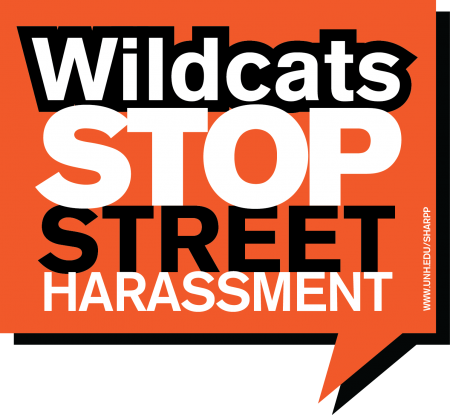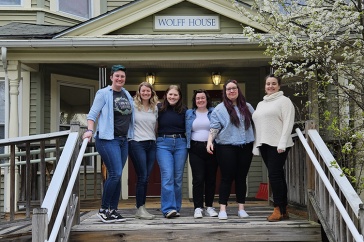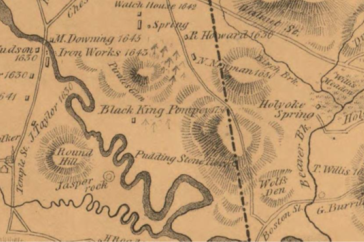
Hey there, Wildcats! As a part of SHARPP’s recent campaign to stop street harassment on campus, we are bringing Holly Kearl from Stop Street Harassment to Johnson Theatre this Wednesday at 7 p.m. I recently spoke with Holly about why we all deserve safe public spaces.
SHARPP: What got you interested in starting Stop Street Harassment?
Holly Kearl: My own experiences of being harassed, especially as a college student in northern California, led me to write my master’s thesis on street harassment in 2007 at George Washington University. I focused on websites that were fairly new at that time, where women could share their stories and find resources. That’s when I learned how many women, including my own friends and family, faced street harassment regularly and how few of them talked about it or knew what to do about it.
In 2008, when I noticed the best websites I had studied were gone or inactive, I began Stop Street Harassment (SSH) to fill in the gap and share the resources on the topic I knew about. I also launched a companion blog where people anywhere in the world could share their stories.
Next, I wrote a book on street harassment in 2010, and I founded International Anti-Street Harassment Week in 2011 to allow groups all over the world to take a stand at the same time. SSH began doing other programming, and it received 501c3 non-profit status in 2012.
SHARPP: What are some of the successes you have experienced with this organization?
Kearl: Since 2011, we’ve organized International Anti-Street Harassment Week each spring; groups of people in up to 40 countries take part. The UN has recognized the week. It always results in a lot of localized and global awareness-raising efforts. This is the report from the most recent week. UNH took part this year.
In 2012, SSH joined Collective Action for Safe Spaces in activism to pressure the Washington, D.C.-area transit authority to address sexual harassment on the system. We were successful, and I’ve been an advisor on their campaign ever since. This has included giving input on three different PSA campaigns; advising on a system-wide survey on sexual harassment, and advising they conduct employee trainings.
In 2014, after nearly two years of fundraising, we were able to work with national survey firm GfK to do the first large-scale nationally representative survey on street harassment in the USA. For the first time, we had data to back up the thousands of story submissions we’d received over the years. The findings are regularly used by government entities, researchers and journalists, and the findings helped bring more legitimacy to the issue.
As one more example of a success, last year we partnered with the Rape, Abuse & Incest National Network and Defend Yourself to launch a national street harassment hotline — the first of its kind in the world. We just passed the one-year mark since it launched, and an average of one person per day uses it.
SHARPP: What are some of the challenges?
Kearl: For the first several years, it was very hard to get most people to understand what street harassment is and why it matters. A lot more people are aware now than when we first began, but there are still plenty of people who think street harassment is no big deal, a compliment or that there are more serious issues to worry about. Related, it’s always hard to find people willing to donate to our efforts, and I’ve had to self-fund a lot of it or heavily rely on crowd-sourcing among friends, family and SSH visitors.
SHARPP: In your ideal world, where will this work go in the future? Essentially, what is your end goal?
Kearl: Ideally, in time I’d like to do more work with schools and groups that work with boys and young men. Research shows that the vast majority of street harassment faced by persons of all genders is committed by boys and men, so we need to focus on them if we want to stop it. I’d also like to see more anti-harassment campaigns on public transit and on billboards, and I’d like to stop seeing street harassment portrayed as a compliment or OK in pop culture/media.
SHARPP: For people interested in this type of work, what is your advice?
Kearl: For anyone who wants to become an activist on a specific issue, I suggest starting by doing your research. See who else is doing this work and if you can collaborate with them or if there’s a gap that needs to be filled and you can fill it. Too often, well-intentioned people end up duplicating existing efforts, and that can dilute the impact. Everything SSH does is very intentional and is meant to fill in a gap that other groups aren’t doing (or weren’t doing when we began doing it). We are also big on collaborations and especially see International Anti-Street Harassment Week as a key time to connect with others doing this work and support each other. There really is strength in numbers.
That’s all for this week, folks! Thank you so much to Holly Kearl, for taking the time to speak with me and for coming to campus to educate us about ways to stop street harassment. If you value our campus climate and want to help with Wildcats Stop Street Harassment, then this is the event for you. See you Wednesday at the Johnson Theatre!
SHARPP Presents: Stop Street Harassment Founder and Author Holly Kearl
Wednesday, Sept. 20, 7 p.m. | Johnson Theatre
-
Written By:
Shannon Bryant ’19 | UNH SHARPP
















































